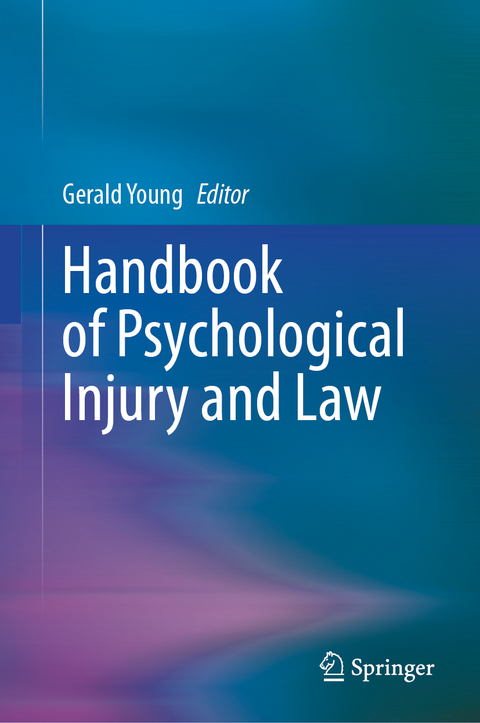
Handbook of Psychological Injury and Law
Springer International Publishing (Verlag)
978-3-031-69733-3 (ISBN)
- Noch nicht erschienen - erscheint am 25.02.2025
- Versandkostenfrei
- Auch auf Rechnung
- Artikel merken
This book provides a comprehensive presentation of psychological problems, such as posttraumatic stress, depression and chronic pain, that are the result of injury or trauma and legal proceedings, such as tort after motor vehicle collisions. It stresses the complex nature of these disabilities, particularly in the judicial setting, and the critical task of accurately assessing and diagnosing the extent of the injury. Assessments involve the use of standardized tests, including those that assess for negative response bias and possible malingering.
The chapters that follow cover key psychological disorders and explore their effects in a range of populations, which can vary by age, sex, and minority or racial status. It encompasses international perspectives and emphasizes the importance of relevant factors that affect assessment, rehabilitation, and compensation. It is ideal for psychologists and mental health professionals working in in a field that requires a comprehensive, scientifically-informed, impartial approach to assessment that will stand up in court.
This book provides a comprehensive presentation of psychological problems, such as posttraumatic stress, depression and chronic pain, that are the result of injury or trauma and legal proceedings, such as tort after motor vehicle collisions. It stresses the complex nature of these disabilities, particularly in the judicial setting, and the critical task of accurately assessing and diagnosing the extent of the injury. Assessments involve the use of standardized tests, including those that assess for negative response bias and possible malingering.
The chapters that follow cover key psychological disorders and explore their effects in a range of populations, which can vary by age, sex, and minority or racial status. It encompasses international perspectives and emphasizes the importance of relevant factors that affect assessment, rehabilitation, and compensation. It is ideal for psychologists and mental health professionals working in in a field that requires a comprehensive, scientifically-informed, impartial approach to assessment that will stand up in court.
Gerald Young is a Full Professor in Psychology at Glendon College, York University, Toronto, Canada. He is a Fellow of the Association for Psychological Science (APS) and the American Psychological Association (APA). He has received awards from the American Psychological Association and the Canadian Psychological Association (CPA), including for lifetime achievement. Young is Editor-in-Chief of the journal Psychological Injury and Law, which he founded, and his work in that area has led to invited speaker addresses at scientific conferences. His most recent books include: Revising the APA Ethics Code (Springer, 2017) and Causality and neo-stages in development: Toward unifying psychology (Springer, 2022). He has appeared as an expert witness for a case involving the Supreme Court of Canada. His practice covers rehabilitation and couples/ families.
Chapter 1. Introduction to Psychological Injury and Law: Past, Present, and Future.- Chapter 2. The Legal Basis of Psychological Injury: A Primer on Tort Law and Evidence Law.- Chapter 3. Forensics: Methodological Challenges and Empirical Evidence.- Chapter 4.
Ethical Considerations in Psychological Injury and Law
.- Chapter 5. Forensic Assessment of Posttraumatic Stress Disorder, Complex PTSD, and Other Trauma-Related Disorders in Juvenile Justice Contexts.- Chapter 6. Dissociation and Posttraumatic Complexity in the
Forensic Assessment of Psychological Injury
.- Chapter 7. Trauma-Informed Forensic Mental Health Assessment of Plaintiffs
Alleging Harms from Childhood Abuse
.- Chapter 8.
Evaluating the Effects of Gender Violence in Civil Litigation
.- Chapter 9. Human Rights Violations and Trauma.- Chapter 10. Performance Validity Tests in Neurocognitive/Neuropsychological Assessments.- Chapter 11. Complications in Neuropsychological Assessment.- Chapter 12. Mild and Moderate Traumatic Brain Injury in the Legal Context.- Chapter 13. Test Invalidity and Malingering in the Field of Psychological Injury and Law I: Basics.- Chapter 14. Test Invalidity and Malingering in the Field of Psychological Injury and Law II: New Topics.- Chapter 15. Embedded Symptom Validity Scales in Psychological Injury Evaluations: Focus on the Minnesota Multiphasic Personality Inventory (MMPI-2-RF and MMPI-3) and the Personality Assessment Inventory (PAI).- Chapter 16. Free-Standing Symptom Validity Tests in Psychological Injury Evaluations:
Focus on the Structured Inventory of Malingered Symptomatology (SIMS) and the Inventory of Problems - 29 (IOP-29)
.- Chapter 17. Forensic Assessment of Psychological Injury Claims .- Chapter 18.
International Perspectives on Psychological Injury and Law: Cross-Cultural Aspects of Symptom and Performance Validity Assessment
.- Chapter 19.
Use of the AMA Guides in Disability Determinations in the United States and Canada
.- Chapter 20.
| Erscheint lt. Verlag | 25.2.2025 |
|---|---|
| Zusatzinfo | XXVII, 835 p. 4 illus. |
| Verlagsort | Cham |
| Sprache | englisch |
| Maße | 155 x 235 mm |
| Themenwelt | Geisteswissenschaften ► Psychologie ► Klinische Psychologie |
| Schlagworte | Assault • chronic pain • Forensics • Neuropsychology • psychological injury • PTSD • traumatic brain injury |
| ISBN-10 | 3-031-69733-2 / 3031697332 |
| ISBN-13 | 978-3-031-69733-3 / 9783031697333 |
| Zustand | Neuware |
| Haben Sie eine Frage zum Produkt? |
aus dem Bereich


